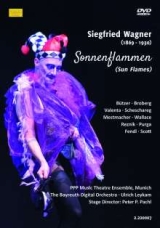 Siegfried Wagner: Sonnenflammen; Uli Bützer (Kaiser Alexios), Rebecca Broberg (Kaiserin), Giorgio Valenta (Fridolin), PPP Ensemble München, Digital-Orchester Bayreuth, Ulrich Leykam; Regie: Peter P. Pachl; 1 DVD Marco Polo 2.220007; Liveaufnahme 08/2020, Veröffentlichung 02/2021 (135') - Rezension von Norbert Tischer
Siegfried Wagner: Sonnenflammen; Uli Bützer (Kaiser Alexios), Rebecca Broberg (Kaiserin), Giorgio Valenta (Fridolin), PPP Ensemble München, Digital-Orchester Bayreuth, Ulrich Leykam; Regie: Peter P. Pachl; 1 DVD Marco Polo 2.220007; Liveaufnahme 08/2020, Veröffentlichung 02/2021 (135') - Rezension von Norbert Tischer
Diese DVD ist ein typisches COVID-19 Produkt. 2020 gab es im Rahmen von Bayreuth Summertime nur eine reduzierte Version von Siegfried Wagners Sonnenflammen – mit den Solisten des ‘pianopianissimo-musiktheaters’, ohne Chor und Orchester – als ‘Szenische Vision’ einer Oper mit dem digitalen Orchester von Ulrich Leykam auf der Kulturbühne Reichshof.
Siegfried Wagners achte Oper Sonnenflammen, 1918 in Darmstadt uraufgeführt, handelt von einem Deserteur, der zur Zeit des 4. Kreuzzuges in Konstantinopel strandet, im damals zerfallenden byzantischen Reich, einer Situation, aus der man jene in Deutschland ableiten kann, wie sie zur Entstehungszeit der Oper im Jahr 1912, kurz vor Ausbruch des Ersten Weltkriegs, festgestellt werden konnte. Und in diesem Kontext versucht Fridolin, der Deserteur, am Hofe des Kaisers Alexios sein Glück zu machen, wobei er sich in Iris verliebt, die aber auch von Alexios umflirtet wird.
Peter P. Pachl nutzt diese Situation, um den Verfall des deutschen Kaiserreiches zu karikieren. Dabei helfen ihm die prächtigen, knallfarbigen Kostüme.
Zusammen mit dem digitalen Orchester singen Uli Bützer als hinreißend dekadenter Kaiser und Giorgio Valenta als köstlich larmoyanter Fridolin. Auch die anderen Rollen sind gut besetzt, so dass trotz aller Beschränkungen, ein vergnügliches Opernschauspiel zustande kam.
This DVD is a typical COVID-19 product. In 2020 only a reduced version of Siegfried Wagner’s Sonnenflammen could be performed at the Kulturbühne Reichshof in Bayreith, with the soloists of the ‘pianopianissimo-musiktheater’, without choir and with the digital orchestra of Ulrich Leykam.
Siegfried Wagner’s eighth opera Sonnenflammen, premiered in Darmstadt in 1918, is about a deserter stranded in Constantinople at the time of the 4th Crusade, in the then disintegrating Byzantine Empire, a situation from which one can derive that in at the time of the opera’s composition in 1912, shortly before the outbreak of the First World War. And in this context Fridolin, the deserter, tries to make his fortune at the court of Emperor Alexios, falling in love with Iris, who, however, is also flirted with by Alexios.
Peter P. Pachl uses this situation to caricature the decline of the German Empire. He is helped in this by the splendid, brightly colored costumes.
Singing along with the digital orchestra are Uli Bützer as the ravishingly decadent Kaiser and Giorgio Valenta as the deliciously larmoyant Fridolin. The other roles are also well cast, so that despite all the limitations, an enjoyable opera performance was achieved.
























